William Morris: The Communist Utopia and Human Creativity
News from nowhere
There were two great waves to English socialist thought in the nineteenth century. The first was about the 1830's and we talked about it in the lecture on Robert Owen. The second wave was at the end of the century.
One of the best known socialists of the second wave was William Morris. He was a poet, an artist and a storyteller. Today I am going to tell you one of his stories.
It's called NEWS from NOWHERE and it was published as a serial in the journal of The Socialist League in 1890.
|
The story begins at a meeting of the Socialist League.
Six members are having an argument:- "WHAT WILL LIFE BE LIKE AFTER A SOCIALIST REVOLUTION?" |
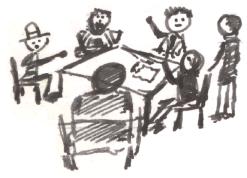
|
Well, Morris got very agitated, and on the tube journey home he began to wish that he could just see a day of what communism would be like.
SWIMMING IN A RIVER
Morris, who was a very rich man, had a house by the river Thames at
Hammersmith.
Leaving the tube station, he stopped to cool his thoughts by the river. It
was a beautiful night in early winter. There was a new moon in the sky and
street lights all along the sides of the river. All except in two places
that is. At one point there was a black patch on each side of the river.
These patches, Morris tells us, indicated the two ends of "an ugly
suspension bridge".
When Morris wakes it is not winter - it's a hot, sunny summer morning and
the riverside trees are covered in leaves! From now on everything in the
story is highly fantastic.
Morris finds a boatman - a man called Richard Hammond - and asks him to row
him out into the river for a swim. He strips of his clothes and jumps of
the boat into clear, clean river water - which is somewhat surprising
because at the end of the 19th century the river Thames was even dirtier
than it is now.
Here we have a medieval bridge built in the future. As we go on with the story we find people wearing medieval clothes, meeting in medieval churches, living in medieval houses and playing medieval instruments. In this strange, sunny world that Morris has entered, the past has somehow caught up with future.
HOW THE PAST CATCHES UP WITH THE FUTURE
I want to pause the story to explain how Morris's Medievalism fits in with
his ideas about work a craftsmanship and the communist future. I will fit
my comments into the series of
modes of
production
that
Marx and Engels
described in their
Communist Manifesto.
Morris thought that Medieval
"Gothic" work was special: It contained
craftsmanship. Next time you visit a
medieval cathedral, look at the detail. Look
at the carving and see with what care and creativity it has been carried
out. Then, on your way home, read
Ruskin
In the movement from feudalism to capitalism, Morris thought, their had
been
a loss of humanity and a loss of craftsmanship. The division of labour
(illustrated by Adam Smith's
pin-factory) removes craftsmanship from work and de-humanizes
the worker.
Communism
Morris believed the good features of the medieval period can be recovered
in a wholly new (egalitarian communist) society.
Compare this with what Marx and Engels has said in the Communist Manifesto
in 1848:
"
The bourgeoisie, wherever it has got the upper hand, has put an end to
all
feudal, patriarchal, idyllic relations. It has pitilessly torn asunder
the
motley feudal ties that bound man to his "natural superiors," and has
left
no other bond between man and man than naked self-interest, than
callous cash payment.
"...
|
Morris tries to pay the boatman for his work. But Richard will not accept
payment. He laughs and suggests that Morris should give the money to a
museum.
This is not just because Morris's Victorian money is out of date. All money is outdated in the communist future. People work for free - because they love working |

|

|
First they could go there and the old man could tell Morris the history of
the country.
Then they will go up river to Oxfordshire, where Richard has promised to help with the hay harvest. |
"But what about your job here?" says Morris. But that is no problem. Richard has a friend staying at the Hammersmith guesthouse who is starving for a bit of river work!
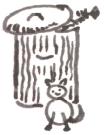
|
Later on they meet another friend: the golden dustman
This man, as well as being the local dustman, wears glorious clothes and writes novels Richard explains to Morris that in this world, manual labour and craftsmanship have a far higher status then mere intellectual work. |
The wares which we make are made because they are needed: men make for their neighbours' use as if they were making for themselves, not for a vague market ...
All work which would be irksome to do by hand is done by immensely improved machinery: and in all work which is a pleasure to do by hand machinery is done without ...
... under these circumstances all the work that we do is an exercise of the mind and body more or less pleasant to be done.
The women were all pleasant to look at, and one was "a pretty girl" who looked about twenty and turns out to be forty-two. In the communist utopia of the future people age very slowly - and, for reasons we will come to shortly, they are all rather good-looking.
The women in Morris's book are mostly engaged in housekeeping and making love to the men. They also play musical instruments and read "pretty books" - one lady, Philippa, and her daughter, are eccentrics. They are stonemasons.
Now none of this would have pleased Victorian feminists. Morris did not intend that it should. Old Hammond explains why feminists are wrong
There are two things they are wrong about: housework and birth control
| "the women do what they can do best, and what they like best" |

|
On the other hand - Morris had servants to do the housework and a wife to manage the servants.
It is a great pleasure to a clever woman to manage a house skilfully Hammond says.
Population and aesthetics
But to move on to birth-control. Under Morris's communism neither
contraception nor chastity appear to have value.
Hammond said that the nineteenth century feminists had wanted to
emancipate at least some women from bearing children.
But, in the communist future, "maternity is highly honoured".
The implication seems to be that women should bear children as a natural
consequence of unregulated intercourse.
We are also led to believe that women doing housework and bearing children
is an important aspect of erotic desire.
Population
Despite the value placed on maternity, the population of England under
communism was still about the same as at the end of the 19th century. The
reason for this was that a lot of people had left to occupy other parts of
the world.
The good looks of the people come from their freedom and good sense
Morris describes marriage under industrial capitalism as a commercial
contract enforceable by law. Under communism, people are not bound to one
another in this way. Couples are free to link and break away without legal
formalities.
This, Hammond argues, is the probable cause of the people's good looks:
"Pleasure" he says
"begets
pleasure"
Aesthetics Morris had strong views about what was beautiful and what
was ugly. He applied these views to human beings and not just to the
objects they worked on. He wanted the crafter to be as beautiful as the
crafted.
Morris says that the human products of industrial capitalism are ugly. The
human products of communism will be physically and morally beautiful.
But what if the genetics of pleasure and the influence of environment are
not as benign as Morris envisages? What if some of us continue to run to
fat, be mentally retarded, age prematurely, have mental breakdowns,
physical deformities, or just suffer from a lot of pimples on our faces?
Can Morris's ideal avoid creating a layer of second-class citizens: the
"not-beautiful" in a society dedicated to a cult of being beautiful?
Morris was writing at the same time that
eugenics was
developing. He does not propose genetic selection, but the ideals he sets
out are similar.
TOWN AND COUNTRY
Morris and Richard travel to london in a horse drawn carriage. At
Kensington they enter a forest that stretches from there to Hackney.
In the communist future, Morris learns, all the large towns have shrunk to
make way for countryside. Industrial towns, like Manchester, and large
coalfields, have vanished altogether.
Later in the story, Old Hammond describes to Morris the three stages of
England's history:
medieval,
industrial, communist.


Medieval England:
"England was once a country of clearings amongst the woods and wastes, with
a few towns interspersed, which were fortresses for the feudal army,
markets for the folk, gathering places for the craftsmen"
Industrial England:
"It then became a country of huge and foul workshops and fouler gambling
dens, surrounded by an ill-kept, poverty stricken farm, pillaged by the
masters of the workshops."
Communist England:
"It is now a garden, where nothing is wasted and nothing is spoilt, with
the
necessary dwellings, sheds and workshops scattered up and down the country,
all trim and neat and pretty."

FACTORIES If the large industrial towns like Manchester and the large coal and iron fields have disappeared - What has happened to the factories? Morris comes across one of the factories of the new age. It is called a banded workshop It does not belch smoke Instead, it is the pleasant place for doing the kind of handwork that it is convenient to do with other people, The one Morris sees is for glass- blowing and pottery-crafts that need kilns and furnaces. But, as I said, no smoke The communist future uses some new, unexplained, power called force which does not smoke and can be provided to people where they live. Power is not concentrated in the coalfields, therefore, but is distributed everywhere - As are the banded workshops, which are scattered all over the country so that anyone who likes this kind of work can do it.
In real history, as electricity developed as distributed power it was as
the energy for even more industrialisation. See Lenin 1920
and
Britain 1926
|

|
Going through the North London forest, Morris cannot help noticing that there are an awful lot of children and young people about.
Groups were wandering about, playing in clearings and sometimes camping with fires to cook their meals.
Richard told him that the children came to live in the forest for weeks on end from all over the country. They were encouraged to do so in order to learn to do things for themselves and to become receptive to nature.
Morris thinks it must be the school-holidays - but Richard just cannot understand the idea of school
In our communist future, children learn without going through a system of teaching
By playing in the forest they learn to swim, to ride ponies and to cook. And by working with adults they learn to mow, to thatch, to do woodwork and to keep shop.
These practical things stretch their minds and so adults are not to worried if they also spend some time reading books!
Nobody teaches children to read. Seeing books lying around "most children... manage to read by the time they are four.."
But there is not much reading until children pass puberty. In fact, over- bookishness is not encouraged. Instead, people take up "genuinely amusing work, like house-building and street-paving, and gardening"
Something else that is not encouraged in young children is writing. Writing too soon is thought to encourage scrawling, and this is bad because writing has been re-established as a craft. People handwrite books for their friends rather than printing them.
WHAT'S LEFT OF LONDON
Emerging from the forest, Morris found that the famous buildings of London
-
St Paul's
Cathedral,
Nelson's Column,
the
National Gallery etc - had been
preserved.
Morris thought most of them were ugly, but he was glad they had been
preserved to remind people of their history.
The building Morris valued was the medieval one:
Westminster
Abbey. To his
pleasure, he found that this had been cleared
"of the beastly monuments to
fools and knaves".
But Morris was surprised to see the
Houses of Parliament
. Oh well, said Richard, we were going to pull them down, but
we used them for storing manure and running a market. So the building was
now known as the dung market
POLITICS UNDER COMMUNISM
The England described in News from Nowhere is already a state-less
society. Morris asked Hammond where the parliament was and Hammond joked
that:
Politically, communism is a lose association of small communes. If a
collective decision is needed, it is made at the local level, with everyone
gathering in the Mote House to discuss the matter.
Usually the village church was the Mote House
No that there are no classes, people do not disagree over principles. They
have no politics or political parties. Their disagreements
are over practical things - like whether to build a new bridge. Such
disagreements are easily settled.
Morris asked Old Hammond if the change from industrial capitalism to
communism had come about peacefully.
It had not. Hammond told him that it had involved strikes and fighting.
The motive power of change, he said, was passion - a longing for freedom
and equality - like the passion of a lover.
The hope of realising a communal life for everyone arose quite late in the
19th century.
But there had been a group of politicians called the state
socialists who did not trust the power of the people: the passion of
the masses.
Instead of leading the workers to a revolutionary overthrow of capitalism;
the state socialists tried to get the condition of the workers ameliorated
by the bosses and the bosses's government.
They wanted the rich to pay a ransom for their riches.
The state socialists did achieve some of their ends
They gained shorter working hours, minimum wages and price control to make
sure inflation did not destroy the value of wages.
They also had government factories set up - but these were inefficient -
Morris was not in favour of nationalisation, he wanted work returned
directly to the people.
But what the state socialists could not provide the workers with was
freedom and control over their lives - The standard of living did not
improve very much and the best thing the workers gained out of this period
of history was the experience of trade union organisation.
A series of commercial crises was brought about - partly by state
socialism and the spread of communist ideas.
1952 was one of the worst of these "bad times".
The trades unions called for trade union control of the economy.
The master class saw this as a declaration of war and prepared to fight
communism.
In one of the Trafalgar Square demonstrations, soldiers fired machine guns
on the demonstrators and over a thousand demonstrators were killed.
(See
1887)
The trade unions set up a Committee of Public Safety. This became
the focus of opposition to the government. It became the centre of a
network of workers associations committed to communism.
It led the masses in civil war and, Morris said, the Committee gained
control over people's minds, whilst the official government only had
control over their bodies.
After two years of civil war, victory was won by the rebels
"Our present parliament would be hard to house in one place,
because the whole people is our parliament"



Headings
INTRODUCTION
How the past catches up with the future
Weavers, mathematicians, printers, dustmen and historians.
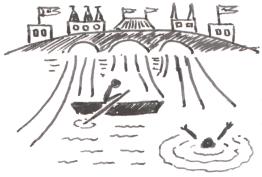
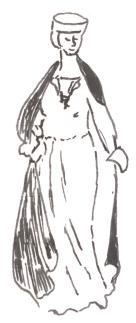

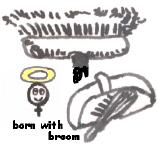




 Click coloured words to go where you want
Click coloured words to go where you want